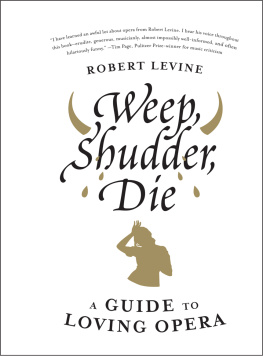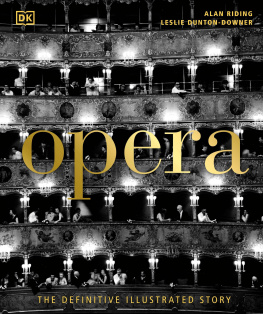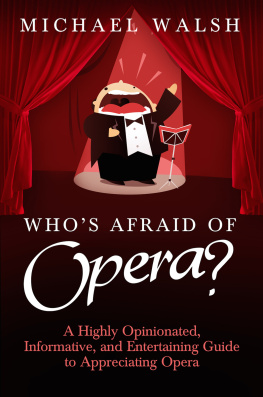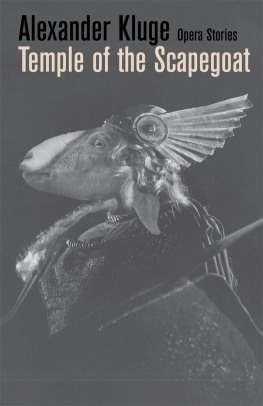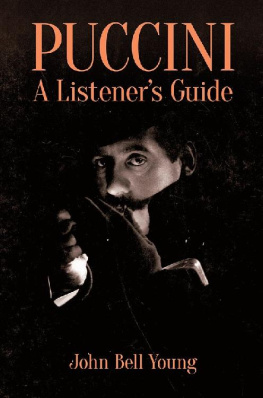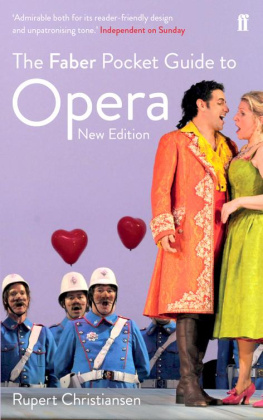Weep, Shudder, Die
A Guide to Loving Opera
Robert Levine

Let us go singing as far as we go; the road will be less tedious.
Virgil, Eclogues
Through singing, opera must make you weep, shudder, die.
Vincenzo Bellini
Contents
Introduction
No Need to Wear your Jewelry
This book is for anyone who has ever been curious about opera for any reason: whether youve discovered a sudden fondness for an aria used in a movie or an advertisement or an appealing singer seen on a billboard or a TV show, whether youve found yourself wondering how opera has lasted for more than four hundred years and seems to have recently caught on with new fervor, whether you want to know how to get into opera without causing any physical or mental harm to yourself or are simply tired of the singing on American Idol . Is opera a lifetime commitment, like marriage used to be? Are opera lovers like geese, mating with opera for life? Or is itand can it bean on-again, off-again thing? Why is it both mocked and perennially adored? If tickets are so expensive, how come everyone who loves it can somehow afford it? Why are there forty recordings of Madama Butterfly or Don Giovanni ? Why do operagoers seeor listen tothe same opera dozens of times?
This book is also for people who want smarter babies, the ability to earn big bucks in their spare time, to take advantage of foreclosed properties, and to learn a foreign language and have flatter abs without leaving the comfort of their homes.
Remember what John Lennon said to an audience that included Queen Elizabeth, the Queen Mother, and Princess Margaret in November 1963: For our last number, Id like to ask your help. The people in the cheaper seats clap your hands. And the rest of you, just rattle your jewelry.
First of All...
Opera, simply, is sung drama, with the story told through both voices and instruments and often involving costumes and sets. It is like theater, in other words, except that the characters sing rather than speak. A group of late-sixteenth- and early-seventeenth-century Italians with money, status, and ideas believed that the plays of Greek antiquity, to which they aspired (the good old days?), had been sung rather than spoken. In fact, this belief was incorrect, but by the time everyone found out, opera had already taken hold, and an entirely new art formand form of entertainmenthad been invented.
The earliest operas used mythology and folklore as their subject matter; the first, now lost, is believed to have been about Dafne, a dryad, or nymph, who was turned into a laurel tree to protect her from the god Apollo. The music was by Jacopo Peri, Giulio Caccini, and Jacopo Corsi, and the opera was presented in Florence in the late 1590s at the suggestion of the poet Ottavio Rinuccini, who rearranged the text from Ovids Metamorphoses . Orfeo (about the mythical musician who goes to hell and back to retrieve his beloved Eurydice), by Claudio Monteverdi, was shown at the court of Mantua in 1607, and thats when opera really got started; Orfeo is still performed today. By 1637 Venice had opened the first public opera house, and by the centurys end, that small city, with a population of 125,000, had seen 350 different operas in seventeen theaters. A typical season ran for from twelve to thirty weeks; the wealthy bought a box for the season; regular people bought tickets for individual performances.
As formulated by Monteverdi and his fancy friends, opera was made up, essentially, of two types of singing, the first being recitatives (as in recite), in which the characters, rather than singing a song about something specific, move the plot forward by singing their sentences to a written-out (not arbitrary) procession of notes that do not necessarily resemble a tune. This is the part of opera that initially makes people uncomfortable; musically pitched speech is abnormal. (In Broadway musicals, characters speak most of the time and then suddenly break into song. Why that should be less weird is beyond me, but there you have it. If youre going to sing at all, why not do it all the time?) A bit of dialogue in recitative might read: Im Apollo and I have slain a serpent and now I want Daphne. Well, Im Cupid and Ill turn her into a tree before you get your hands on her. The other type of singing in opera is the aria. These have tunes you can recognize (after a listen or two, as with any music), are more structured, stop the action, and focus on a particular feeling, event, or situation. My girlfriend got bitten by a snake, now shes dead and Im miserable, so Im going to beg the infernal spirits to send her back is a suitable reason for a full-blown song. (In the case of Monteverdis Orfeo , Im making this up, but you get the idea.) It may be strophic, in two partsone filled with grieving, the other a statement of purpose, with more energyor not, or more. An aria has a formality about it and literally calls a halt to the plot; even the earliest composers realized that the music of an aria had better be spellbinding, illuminate the situation, and keep the listener fascinated, because of its beauty or drama or the capability on the part of the singer to create beauty and dramapreferably both. Choruses pop up now and then to comment on the action, to be friends or witches or soldiers or rabble.
These basic elementsexperimental works asidethat make up an opera are pretty much the same after more than four hundred years.
Thousands of operas were composed and performed during the eighteenth and nineteenth centuries (and into the first quarter of the twentieth), mostly in Italy, France, and Germany, and less so in England. (Opera houses also flourished in the United States in the nineteenth century, performing European works, but that is a story for another time.) Most people have heard of the still-popular composers, but for every Monteverdi, there were a few Cavallis and Caccinis; for every Handel, Lully, and Rameau, there was a gaggle of Kaisers, Grauns, Leos, Hasses, Bononcinis, Sarros, and Mondonvilles; for each Mozart, you could find a dozen Salieris; for each Bellini, Rossini, and Donizetti (the last of whom, alone, wrote almost seventy operas), there were plenty of Pacinis, Mercadantes, Mayrs, Payrs, and Meyerbeers; for each Wagner and Verdi and Mussorgsky, there was a handful of Marschners and Boitos; and for each Puccini and Richard Strauss there was a bunch of Mascagnis, Leoncavallos, Zandonais, Schillers, and Schrekers. Each town of any size had an opera house; some had several. If a new work did not please, it was replaced a night or two later by either an older, popular one or something new. Opera was the form of popular entertainment; the public took the characters and the music equally seriously. At the premiere of Gaetano Donizettis Lucia di Lammermoor , people in the audience cried openly when the heroine went mad. We like to weep at art; its a good way to reach inside without feeling were getting too personal. A shared catharsis is a good thing, and in the case of opera, it is both diverting and private.
To mention just one example of operas all-consuming presence, Giuseppe Verdi refused to give the orchestra or tenor the music to La donna mobile (in Rigoletto ) until the last moment because he was afraid that the tune was so catchy that the gondoliers would be humming it before the opening and spoil the surprise. Indeed, the morning after the premiere, everyone in Venice was singing it. Those who did not attend operas still heard the music, and they would sometimes adapt the melodies for home entertainment. Opera was an unavoidable and welcome fact of life, and though it may have attracted the rich and fancy, many seats were offered for the equivalent of pocket change. And the hoi polloi remained interested.
Next page
